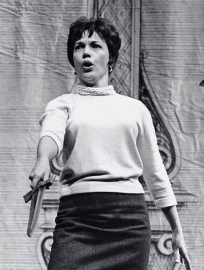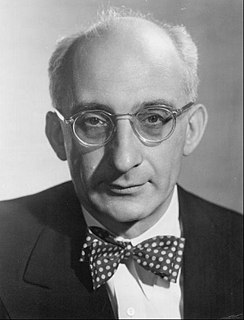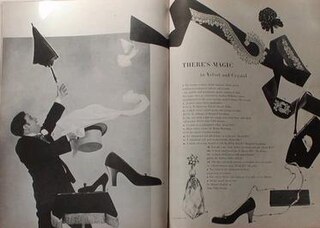Related Research Articles
John M. McCollum was an American tenor who had an active singing career in operas, concerts, and recitals during the 1950s through the 1970s. As an opera singer he performed with companies throughout North America, mostly working with second tier opera houses. He was much more successful as a singer of oratorios and other works from the concert repertoire, and enjoyed a particularly productive and lengthy relationship with the Boston Symphony Orchestra. As a concert singer he sang a wide repertoire but drew particular acclaim for his performances in the works of Johann Sebastian Bach and George Frideric Handel.
Patricia Neway was an American operatic soprano and musical theatre actress who had an active international career during the mid-1940s through the 1970s. One of the few performers of her day to enjoy equal success on both the opera and musical theatre stages, she was a regular performer on both Broadway and at the New York City Opera during the 1950s and 1960s.

Beverly Wolff was an American mezzo-soprano who had an active career in concerts and operas from the early 1950s to the early 1980s. She performed a broad repertoire which encompassed operatic and concert works in many languages and from a variety of musical periods. She was a champion of new works, notably premiering compositions by Leonard Bernstein, Gian Carlo Menotti, Douglas Moore, and Ned Rorem among other American composers. She also performed in a number of rarely heard baroque operas by George Frideric Handel with the New York City Opera (NYCO), the Handel Society of New York, and at the Kennedy Center Handel Festivals.
Richard Cross is an American bass-baritone who had an active international opera career from the late 1950s through the 1990s. Possessing a rich and warm voice, Cross sang a broad repertoire that encompassed works from a wide variety of musical periods and styles. He currently teaches on the voice faculties of the Yale School of Music, the Juilliard School, and the State University of New York at Stony Brook.
Jean Kraft was an American operatic mezzo-soprano. She began her career singing with the New York City Opera (NYCO) during the early 1960s, after which she embarked on a partnership with The Santa Fe Opera from 1965 through 1987. In 1970 she joined the roster of singers at the Metropolitan Opera in New York City where she remained a fixture until 1989. She also performed as a guest of many other opera companies throughout the United States. In 2005 Opera News called her "a gifted mezzo and observant, imaginative actress who lent distinction to a wide range of character roles. By the end of her Met tenure, she had sung nearly 800 performances and become a solid audience favorite."
Eunice Alberts (1927–2012) was an American contralto who had an active career as a concert soloist and opera singer during the 1950s through the 1980s.

Beverly Bower was an American operatic soprano who had an active international opera career from the mid-1950s through the early 1970s. She began her opera career at the New York City Opera where she sang between 1956 and 1963. She later worked mainly as a freelance artist with important opera companies throughout the United States and with a few opera companies in Europe.
William Chapman was an American operatic baritone and stage actor. He appeared in several Broadway productions and was notably a leading performer at the New York City Opera from 1957 through 1979.
Lee Venora is an American operatic soprano and musical theater actress. She was highly active with the New York City Opera between 1957 and 1967 and a regular performer at the San Francisco Opera between 1961 and 1966. She also appeared in a few Broadway musicals, Lincoln Center revivals, and national tours of musicals during her career. Composer and conductor Leonard Bernstein was an admirer of her voice, and she performed with him and the New York Philharmonic on a number of occasions during the late 1950s and early 1960s. She also sang with the orchestra on a couple of recordings and appears on a few musical recordings as well.
Michael Pollock was an American operatic tenor, opera director, and voice teacher. He notably worked as both a performer and director at the New York City Opera during the 1940s and 1950s.

The NBC Opera Theatre was an American opera company operated by the National Broadcasting Company from 1949 to 1964. The company was established specifically for the purpose of televising both established and new operas for television in English. Additionally, the company also gave live theatrical presentations of operas, sponsoring several touring productions in the United States and mounting works on Broadway.

Andrew McKinley was an American operatic tenor, violinist, arts administrator, music educator, and school administrator. Although he mainly performed in the United States, he had an active international singing career with major opera companies and symphony orchestras from the 1940s through the 1960s. His repertoire spanned a wide range, from leading tenor parts to character roles.
Leon Lishner was an American operatic bass-baritone. He was particularly associated with the works of Gian Carlo Menotti, having created parts in the world premieres of four of his operas. He performed in many productions with the New York City Opera and the NBC Opera Theatre during the 1950s and early 1960s.

Richard Torigi was an American baritone and voice teacher. He had an active singing career in operas, concerts, and musicals from the 1940s through the 1980s. While still performing, he embarked on a second successful career as a voice teacher which led to teaching positions at a variety of institutions, including the Juilliard School, the Eastman School of Music, and the Academy of Vocal Arts.
Herbert Grossman was an American conductor who was chiefly known for his work within opera and musical theatre.
David Anthony Stuart Atkinson was a Canadian baritone and New York Broadway actor/singer. Most of his career was spent performing in musicals and operettas in New York City from the late 1940s through the early 1970s, although he did appear in some operas and made a few television appearances. In 1952 he created the role of Sam in the world premiere of Leonard Bernstein's Trouble in Tahiti. From 1956-1962 he was a leading performer at the New York City Opera where he starred in several musicals and appeared in the world premieres of several English language operas. His greatest success on the stage came late in his career: the role of Cervantes in Man of La Mancha which he portrayed in the original Broadway production, the 1968 national tour, and in the 1972 Broadway revival.
Elaine Bonazzi was an American operatic mezzo-soprano who had an active international career from the 1950s through the 1990s. A singer with an unusually broad repertoire that encompassed both classical and contemporary works, she notably created roles in the world premieres of operas by composers Dominick Argento, David Carlson, Carlisle Floyd, Gian Carlo Menotti, Thomas Pasatieri, and Ned Rorem. In the United States she was particularly active with the New York City Opera, the Santa Fe Opera, and the Washington National Opera.
Frank Porretta Jr. was an American tenor who had an active career performing in operas, musicals, and concerts from 1952 through 1971. He had a particularly fruitful relationship with the New York City Opera from 1956 to 1970 where he sang a highly diverse repertoire; including roles in new operas by composers Norman Dello Joio, Carlisle Floyd, Vittorio Giannini, and Robert Ward. For the NBC Opera Theatre he portrayed The Astronaut in the world premiere of Gian Carlo Menotti's Labyrinth.
Don Yule was an American operatic bass who performed regularly with the New York City Opera (NYCO) for fifty years. A graduate of the Jacobs School of Music at Indiana University, he joined the NYCO in 1960 where he made his debut as Gluttony in a revival of Hugo Weisgall’s Six Characters in Search of an Author. He went on to perform in a total of 83 roles with the NYCO in more than 1,700 performances, most often in comprimario parts. Some of the roles he was associated with included Alcindoro and Benoit in Giacomo Puccini's La Bohème, Antonio and Bartolo in Mozart's The Marriage of Figaro, Dr. Grenvil in Giuseppe Verdi's La Traviata, and the Jailer and the Sacristan in Puccini's Tosca.
Thomas Jamerson is an American baritone who had an active international career as an opera and concert performer from the 1960s through the 1990s. He first drew distinction in the field of opera in 1968 when he recorded the role of Baron Douphol in Giuseppe Verdi's La traviata for RCA with conductor Georges Prêtre, the RCA Italiana Orchestra, and Montserrat Caballe as Violetta and Carlo Bergonzi as Alfredo. In 1969 he portrayed roles in the United States premieres of two operas at the Santa Fe Opera: Der Auserwählte in Arnold Schoenberg's Die Jakobsleiter and Captain of the Royal Guard in Hans Werner Henze's The Bassarids. He was a principal artist with the New York City Opera from 1969 to 1984. In 1971 he notably created the role of Professor Bolental in the world premiere of Gian Carlo Menotti's The Most Important Man. He currently teaches voice on the faculty at the Music Conservatory of Westchester in White Plains, New York.
References
- ↑ "Herbert Beattie Obituary - Death Notice and Service Information". Legacy.com. Aug 26, 2019. Retrieved Mar 12, 2021.
- ↑ "Beattie Herbert". www.bach-cantatas.com.
- ↑ Ross Parmenter (October 12, 1957). "NEW CONDUCTOR LEADS CITY OPERA; Arturo Basile of Italy Guides 'Traviata' Performance-- Beverly Sills Is Violetta Achieves Surges of Color Sets Modestly Attractive". The New York Times .
- ↑ Howard Taubman (October 28, 1957). "Music: Hardy Perennial; City Center Revives 'The Merry Widow'". The New York Times .
- ↑ "'CARMEN' PRESENTED AT THE CITY CENTER". October 28, 1957.
- ↑ "Opera: Substitute for the Understudy; Beattie, Bass, Scores in His Big Chance". The New York Times . November 4, 1957.
- ↑ Howard Taubman (October 8, 1958). "Opera: Strauss' 'The Silent Woman'; American Premiere Is Sung at City Center". The New York Times .
- ↑ Ross Parmenter (October 20, 1960). "Opera: Egk's U.S. Debut; ' The Inspector General' in Premiere at Center". The New York Times .
- ↑ Ken Wlaschin (2006). Encyclopedia of American Opera. p. 211. ISBN 9780786421091.
- ↑ "Herbert Beattie". San Francisco Opera Archives.
- ↑ "WORLD PREMIERE FOR WARD OPERA; 'Lady From Colorado' Given in Western Mining Town". The New York Times . July 5, 1964.
- ↑ Jerry L. McBride (2011). Douglas Moore: A Bio-bibliography. A-R Editions, Inc. p. 188. ISBN 9780895796660.
- ↑ Daniel Kessler (2008). Sarah Caldwell: The First Woman of Opera . Scarecrow Press.
- ↑ Ezra Schabas; Carl Morey (2000). Opera Viva: The Canadian Opera Company The First Fifty Years. Dundurn. p. 1977. ISBN 9781459721173.
- ↑ "DR. KING IS HONORED IN CARNEGIE CONCERT". The New York Times . May 25, 1968.
- ↑ Donald L. Hixon (2000). Gian Carlo Menotti: A Bio-bibliography. Greenwood Publishing Group. p. 59. ISBN 9780313261398.
- ↑ Paul Gruber (1993). The Metropolitan Opera Guide to Recorded Opera. W. W. Norton & Company. p. 266. ISBN 9780393034448.